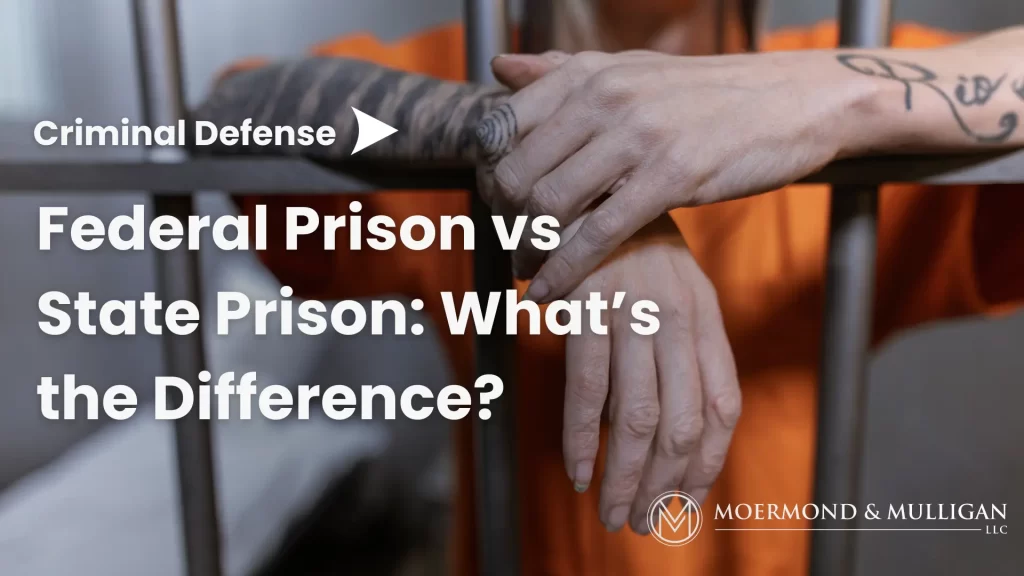Posted on Wednesday, May 8th, 2024 at 3:47 pm

Whether you are facing federal or state criminal charges in Ohio, the prospect of incarceration is daunting. And if you’ve been charged with both a federal and a state crime, the difference between federal prison and state prison can be one of many factors that inform your attorney’s defense strategy. Federal and state prisons differ significantly in terms of their management, conditions, and the nature of offenses that typically land individuals in these facilities. Federal prison vs state prison – what’s the difference?
What Is the Difference Between Federal Prison and State Prison?
If you’re convicted on federal or state charges that result in a prison sentence, you’re no doubt apprehensive about what your life will be like in prison. Federal and state prisons are quite different. What is the difference between state and federal prisons?
Federal Prison
Federal prisons, managed by the Federal Bureau of Prisons (BOP), accommodate inmates convicted of federal crimes. They fall into various security levels:
- Minimum Security: Federal prison camps, known as minimum security prisons, have minimal fencing and a low staff-to-inmate ratio, and house low-risk inmates.
- Low Security: Features double-fenced perimeters and more staff than minimum security, housing inmates with lower flight risks.
- Medium Security: These facilities, equipped with even stronger perimeters and an increased number of staff members, handle inmates who require more supervision.
- High Security: High-security prisons or penitentiaries feature walls, multiple guard towers, and strict surveillance to manage the highest-risk inmates.
- Administrative: These facilities are used for specialized purposes, such as pre-trial detainees, inmates with extreme health issues, or those needing high-level security not available in other security-level prisons.
All federal prisons aim for uniformity in procedures and living conditions, promoting predictability in daily routines. Federal sentencing guidelines and federal prison systems are also under federal agencies such as the Department of Justice and the Federal Bureau of Prisons.
State Prison in Ohio
The Ohio Department of Rehabilitation and Correction (ODRC) administers state prisons, and they categorize their more than two dozen facilities based on varying security levels designed to handle different types of inmates:
- Minimum Security: These facilities are typically more open, offering inmates dormitory-style housing with less restrictive movements. The environment encourages participation in work-release programs and rehabilitation initiatives to prepare inmates for eventual reintegration into society.
- Medium Security: With increased security measures compared to minimum security, these institutions still allow some movement but under stricter surveillance. The living conditions are more regimented, and inmates may have access to educational and vocational training programs within a more controlled setting.
- Maximum Security: These are the most restrictive facilities in the Ohio system, designed to house the most serious offenders. Inmates experience limited movement, heavily monitored interactions, and high-security measures. The living conditions are stringent, focusing on maintaining security and control over the inmate population.
Each security level in Ohio’s state prisons reflects distinct management styles and living conditions tailored to their respective inmate populations’ security needs and rehabilitation goals.
Who Goes to Federal Prison? Federal vs. State Crime
The crime committed and the charges brought against a person will be the primary determining factors about where they are incarcerated. What crimes does make you end up in federal prison vs state prison? Examples of federal vs state crimes are as follows:
Federal Crimes
Federal crimes are offenses that violate United States federal laws and are prosecuted by the federal government. These crimes typically involve crossing state lines or offenses against federal institutions or employees. Individuals convicted of these crimes serve their sentences in federal prisons, which the Federal Bureau of Prisons manages. Most of these federal crimes are typically known as white-collar crimes. Examples of federal crimes include:
- Drug trafficking: Manufacturing, distributing, or importing controlled substances across state lines or international borders
- Bank robbery: Robbing a federally insured bank or financial institution
- Mail fraud: Using the U.S. Postal Service or other interstate mail carriers to commit acts of fraud
- Tax evasion: Falsifying information to avoid paying federal taxes
- Immigration offenses: Illegal entry, overstaying a visa, or other violations of federal immigration laws
- Counterfeiting: Producing fake money, goods, or documents with the intent to deceive
- Internet crimes: Using the Internet to commit crimes that involve crossing state or international borders, such as phishing, cyberstalking, or cryptocurrency scams
- Gun trafficking: Transferring of firearms or weapons from a legal market to an illegal market
State Crimes in Ohio
State crimes are violations of specific Ohio state laws and are prosecuted at the state courts and local level. These crimes typically occur within the state’s borders and do not involve federal property or violate federal laws. Crimes that result in state prison sentences in Ohio include:
- Assault: Causing physical harm or threatening to harm another person
- Burglary: Unlawfully entering a building with the intent to commit a crime, typically theft
- DUI (Driving Under the Influence): Operating a vehicle under the influence of alcohol or drugs
- Theft: Unauthorized taking of property from another person with the intent to deprive them of it
- Homicide: Unlawfully killing another person, either intentionally or through reckless behavior
- Domestic violence: Physical, psychological, or sexual abuse toward a family member or someone in a domestic relationship
- Drug possession: Illegally possessing controlled substances, which varies in severity depending on the drug type and amount
- Vandalism: Willfully causing damage to property belonging to another person or the state
Defending Against Federal vs. State Crimes
 What should you do when charged with offenses that may get you to federal prison vs state prison? The defense strategies for federal and state crimes differ significantly, mainly due to the distinct legal frameworks and procedural rules governing each system. Federal courts often deal with more complex legal issues and require a deep understanding of federal laws and regulations. State crimes, particularly in Ohio, demand a thorough knowledge of local laws and the nuances of state judicial processes. The court system and the criminal justice system can be difficult to navigate, as they can have multiple layers of procedure and red tape to consider.
What should you do when charged with offenses that may get you to federal prison vs state prison? The defense strategies for federal and state crimes differ significantly, mainly due to the distinct legal frameworks and procedural rules governing each system. Federal courts often deal with more complex legal issues and require a deep understanding of federal laws and regulations. State crimes, particularly in Ohio, demand a thorough knowledge of local laws and the nuances of state judicial processes. The court system and the criminal justice system can be difficult to navigate, as they can have multiple layers of procedure and red tape to consider.
At Moermond & Mulligan, LLC, we pride ourselves on our adept handling of both federal and state criminal cases. With a combined experience of over 50 years in representing defendants across Ohio’s state and federal courts, our legal team has the knowledge and skills required to tackle the complexities of any criminal charge.
Our Cincinnati criminal defense attorneys are committed to providing top-notch legal representation to each of our clients. We approach every case with a tailored strategy aimed at achieving the best possible outcome in those unique circumstances.
Recognizing the challenges that come with criminal charges, we offer a free, confidential consultation to discuss your case details and explore the most effective defense strategies. This initial consultation is the first step in preparing a robust defense, whether you’re facing charges at the state or federal level.
Contact an Ohio Criminal Defense Lawyer Now
If you’re facing federal offense or state criminal charges in Ohio, leverage our extensive experience and commitment to excellence in criminal defense to your advantage. Contact Moermond & Mulligan, LLC online or by calling (513) 421-9790 for your initial consultation and start building a strong defense today.
Related Posts:
How to Get Credit for Time Served in Jail
Written By: Moermond & Mulligan, LLC
Last Updated: 02-11-2025